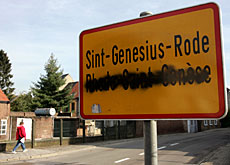
Swiss and Belgian federalism go different ways

Belgium is in the midst of a political crisis – tensions are high between Flemish and French-speaking politicians and there is talk of the country splitting in two.
Although the country resembles Switzerland in terms of size and federal system, experts say it has dealt with multiculturalism differently. The Swiss favour consensus, the Belgians confrontation.
“Two languages, two cultures, two economies and a growing ignorance of their neighbour’s real situation,” is how Jean Faniel, researcher at the Centre for Socio-Political Research and Information in Brussels in Belgium, sums up the situation.
Jacques Neyrinck, a Swiss politician of Belgian origin, said that the situation was “to be expected ever since the creation of a country that doesn’t really exist”.
On August 23 Belgium slid into a political impasse after Yves Leterme, leader of the Flemish Christian Democrats – the winner of June’s elections – failed to form a coalition government.
He and other Flemish leaders want to hand more power to regional authorities, but this has been rejected by French-speaking politicians in Wallonia.
The situation became so acute that King Albert II had to intervene – the first time the Crown has done so since Belgian Congo won its independence in 1960.
Entrenched differences
The two regions are very different. The Dutch-speaking north of the country is mostly in the hands of the Christian Democratic Party. The French-speaking south is dominated by the Liberal Party that was the big loser in the last elections.
But when Belgium was founded in 1831 it was the Flemish who felt marginalised. However, since taking control of the economy in the 1970s, “they have changed the situation and no longer want to share with the Walloons”, Faniel told swissinfo.
“This country is the product of Napoleonic wars as well as of the will of the great powers, and the wishes of the people were never taken into account,” added Neyrinck.
This was different from Switzerland, he said, where the cantons had gradually become allies to defend themselves against their larger neighbours.
The Swiss have also suffered from wars and religious conflicts. “But everyone had to pull their weight,” said Thomas Fleiner, director of the Institute of Federalism at Fribourg University.
But Faniel said that in Belgium federalism had resulted in a situation where there was always a winner and a loser.

More
Federalism
Opposition versus consensus
The Swiss, on the other hand, had always tried to take differences into consideration, with the state playing its federative role. This was in opposition to Belgium, where Flemish demands meant that the state was left with only a few powers, such as foreign affairs, said Fleiner.
Nevertheless, the Walloons were also “ferociously rejecting all new reforms whether through blindness or fear of losing out financially”, he added.
Faniel said that the Flemish felt that they were losing out to the Walloons when federal funds were distributed. “Whereas in Switzerland you have a redistribution mechanism between the cantons,” he said.
The Flemish are now threatening to split the country – an idea that was once highly taboo. “Separatist ideas are gaining ground because the new generation of politicians is less attached to the idea of Belgium,” said Faniel.
The Belgian political expert does not however believe that this will happen straightaway. But Neyrinck is convinced that it would be a good idea.
“Czechoslovakia split into two and it worked well. A cold separation is better than a violent one,” he said.
For Fleiner, direct democracy is what makes all the difference in Switzerland. “Issues of conflict are resolved by the citizens and by the government which has to find a consensus in order to propose compromises acceptable to everyone,” he told swissinfo.
swissinfo, based on a French article by Isabelle Eichenberger

More
Consensus politics and power-sharing
Switzerland:
Population: 7.5 million
National languages: German (63.7 per cent), French (20.4 per cent), Italian (6.5 per cent), Romansh (0.5 per cent)
Founded: 1848
Structure: Federal state
Belgium is a federal state as well as a constitutional monarchy. The head of state is the King.
There are 10.5 million inhabitants of which almost 60 per cent speak Dutch (Flemish) and around 40 per cent speak French.
It was founded in 1831 after the French-speaking nobility displaced the Dutch. But the two communities are not equal and cohabitation is difficult.
Since the Second World War Flanders has flourished and Wallonia has become more depressed. Unemployment stands at 8% in Flanders and 18% in Wallonia.
The constitution was amended in 1993. Federalism was adopted and inequalities were tackled.
On June 10, 2007 the Christian Democrats won 30% of the vote in Flanders and 30 of the 150 seats in the lower house of parliament. Leader Yves Leterme calls for more federalism, a move the Walloons reject.
King Albert 11 charged Leterme with creating a coalition government in July, but Leterme announced he was giving up on August 23.
The king has since designated two negotiators to restart dialogue.

In compliance with the JTI standards
More: SWI swissinfo.ch certified by the Journalism Trust Initiative

























You can find an overview of ongoing debates with our journalists here . Please join us!
If you want to start a conversation about a topic raised in this article or want to report factual errors, email us at english@swissinfo.ch.